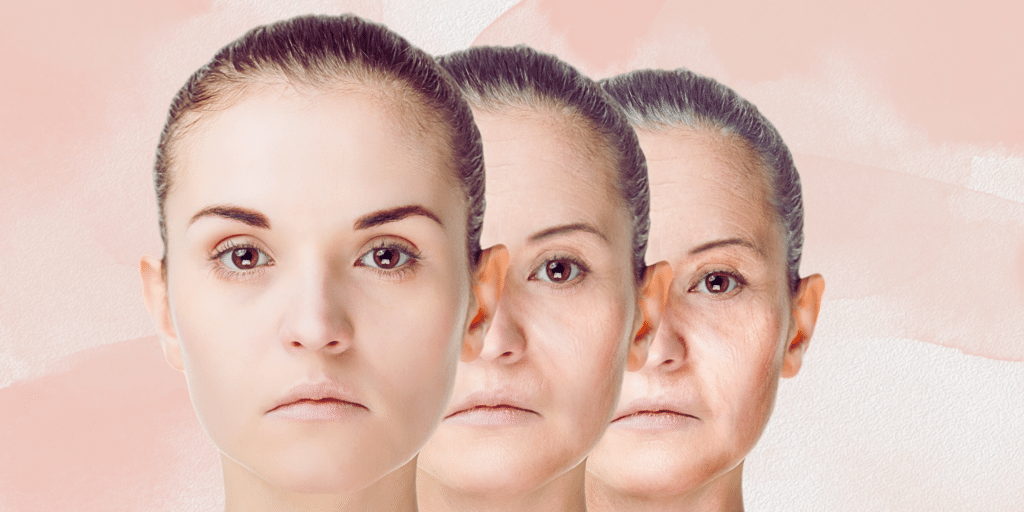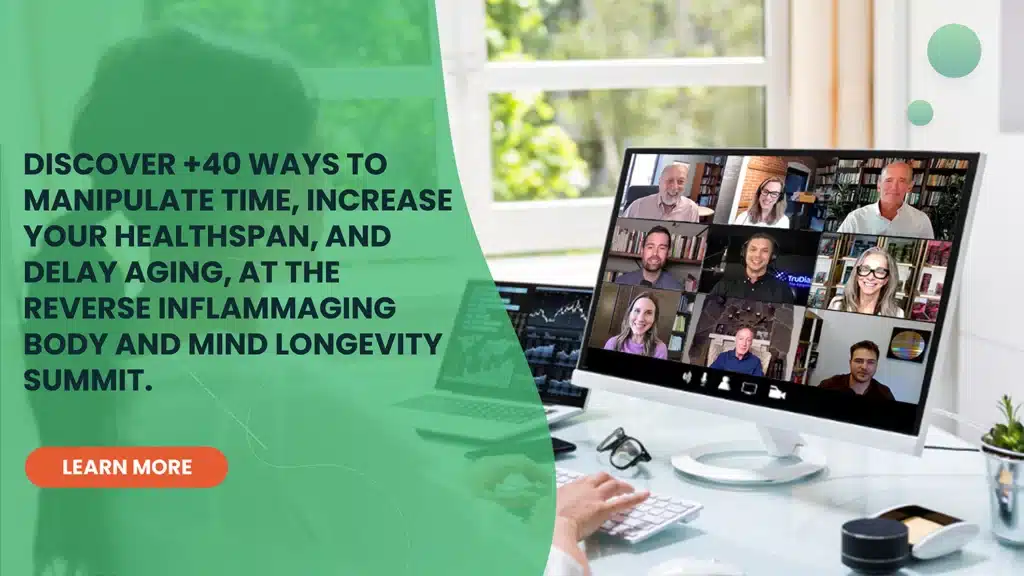|
Getting your Trinity Audio player ready...
|
Why Inflammaging Matters for Your Health and Longevity
Inflammation is helpful during short-term injury or infection, but when it becomes chronic, it can cause significant issues as you age. If chronic inflammation while aging, termed inflammaging, is not managed well, it can increase the risk of age-related diseases.
Key Points
- Chronic inflammation contributes to many diseases
- Aging naturally increases chronic inflammation, known as inflammaging
- Ways to combat inflammaging include improving diet and increasing exercise while limiting chronic stress and exposure to environmental pollutants

Inflammaging: an overview
Aging often leads to a worsening of physical and mental abilities, and it is well-known that aging is a primary risk factor for developing chronic diseases. Yet, there are many adults that enjoy great health at advanced ages.
So, what is a primary factor causing adults to develop chronic diseases while aging? One primary cause has been identified by researchers to be chronic, low-grade inflammation without infection, which is called “inflammaging”. Essentially, it is a combination of the words “inflammation” and “aging”.
As we age, the immune system becomes less effective at fighting off infections and repairing damaged tissue. Over time, there is buildup of pro-inflammatory markers within the body to cause chronic inflammation. This chronic inflammation, or inflammaging, can damage tissues and organs, leading to the development of age-related diseases. For example, inflammaging can contribute to:
There are many factors that contribute to inflammaging, including genetic factors, chronic infections, environmental toxins, and lifestyle factors such as poor diet and lack of exercise. Inflammaging is a complex process, and researchers are working to fully understand its mechanisms.
Experts, like Dr. Robert Lufkin and Dr. Stephen Sideroff, are dedicated to understanding inflammaging and its link to shortened healthspan, which is the period of life that an individual is free from chronic or age-related diseases. They believe that understanding the causes of inflammation is one key that will help you improve the effects of inflammaging on your body, and their work will give you the knowledge and tools so you can increase your healthspan and limit inflammaging.

- Access the Reverse Inflammaging Summit
Learn from top leaders in the field the skills you need today.
Inflammation: Short term protection, but a long term threat
It is important to know that not all inflammation is bad. According to a study in The Journals of Gerontology, inflammation plays a crucial role for healing short-term issues, but it causes problems if the inflammation is chronic.
Acute inflammation is a rapid and short-term response to an injury or infection. It is a necessary and normal physiological response that eliminates the source of injury or infection and promotes tissue healing. The symptoms of acute inflammation include redness, swelling, pain, and sensitivity in the affected area. Examples of conditions that can cause acute inflammation include:
- Cuts or bruises
- Fractures or sprains
- Bacterial infections
On the other hand, chronic inflammation, or inflammaging, is a long-term, systemic response of the immune system that persists even after the initial cause of inflammation has been resolved. Inflammaging can occur when the immune system is unable to eliminate the source of injury or infection or when it mistakenly attacks healthy tissues. Further, the pro-inflammatory markers in the body that are associated inflammaging can build up when the body is consistently exposed to conditions that cause inflammation like:
- Poor diet
- Chronic stress
- Lack of exercise
- Poor sleep or a lack of sleep
- Weakened immune system
- Environmental factors: exposure to pollutants like air pollution and heavy metals
- Chronic infections like Hepatitis C, HIV, and H.pylori
- Accumulation of senescent cells
In summary, acute inflammation is an essential, short-term response to injury or infection and will help your body return to normal, but inflammaging is the chronic inflammation that remains during aging and can lead to chronic diseases.

Why Does Inflammation Increase with Age?
As we grow older, we experience a variety of hormonal and physical changes, and some of these can cause increases in inflammation over time. However, the degree of some of these changes can be mitigated by our lifestyle choices.
Lifestyle factors are a cornerstone to understanding inflammation. Poor diet, chronic stress, and a lack of exercise are frequently discussed by Dr. Robert Lufkin and Dr. Stephen Sideroff as major contributors to inflammaging.
Certain foods increase inflammation, and having a poor diet that is high in processed, sugary, and fried foods throughout your life can cause inflammation to occur more frequently. Further, foods high in saturated or trans-fats, like cheese and fatty cuts of meat, as well as in artificial additives or preservatives trigger inflammation. Lastly, excessive alcohol consumption leads to inflammation of the liver and the body. It is important for you to consider these facts as you attempt to improve your diet to combat inflammaging.
Chronic stress is another major contributor to inflammaging. When you are stressed, various parts of your nervous system activate and release stress hormones like cortisol and adrenaline. These hormones increase the production of pro-inflammatory markers to increase inflammation. If stressors are intense for long periods of your life, your sympathetic nervous system and immune system may become overactive and cause chronic increases in inflammation for long periods of time, which will lead to greater effects of inflammaging.
An article published in 2020 in Sports Medicine and Health Science reported that exercise has been found to regulate inflammation in your body. A consistent lack of exercise throughout your life can increase systemic, low-grade inflammation. Exercise is known to help remove pro-inflammatory markers from your circulation, thereby decreasing systemic inflammation.
A study published in the Journal of Clinical Investigation identifies that our immune system becoming weaker as we age can significantly contribute to inflammaging. There are several reasons why our immune system weakens throughout our lifetime:
- Thymus shrinkage: the thymus gland gradually shrinks as we age, leading to a decrease in the production of T-cells
- Decreased production of antibodies: this can make it harder for the immune system to respond to new or previously encountered pathogens.
- Exposure to pathogens over time
- Lifestyle factors: poor diet, chronic stress, and a lack of exercise
Furthermore, our cells go through cellular senescence as they age and stop dividing. When cells enter senescence, they release many compounds, and several are pro-inflammatory markers, thereby increasing inflammation. As we grow older, rates of cellular senescence increase and can lead to higher concentrations of pro-inflammatory markers, which will increase inflammaging.
Women have another contributing factor that causes increases in inflammation, menopause. When women reach menopausal age, estrogen levels decline. The decline in estrogen levels plays a significant role in inflammaging.
A 2014 study found that estrogen has anti-inflammatory effects through suppression of the production of pro-inflammatory markers. As estrogen levels decrease, more pro-inflammatory markers are produced leading to increases in inflammation. Estrogen also modulates the function of immune cells like T-cells, B-cells, and macrophages. A decline in estrogen can shift the immune system balance towards a pro-inflammatory state.

FAQ: How to limit inflammaging?
As our understanding of inflammaging increases, methods to reduce inflammaging are being identified, and there are steps you can take to limit inflammaging and lengthen your healthspan.
First, Harvard Medical School indicates that reducing your intake of processed, fried, sugary, and saturated or trans-fat foods as well as red meats and alcohol can reduce inflammation. Further, including more whole foods, fruits, vegetables, and lean sources of protein can also limit inflammation.
Second, increasing your level of exercise will help with the clearance of pro-inflammatory markers throughout your body to reduce inflammation. It also causes your muscles to utilize fatty acids to reduce lipid content. Exercise also activates other physical mechanisms that have anti-inflammatory effects.
Third, improving your mental health by reducing chronic stress through medication, breathing exercises, and connecting with others in healthy environments can limit the activation of stress pathways in the body. Additionally, Dr. Sideroff discusses that improving your resilience, or the ability to quickly recover from difficulties, can reduce the effects of aging. These lifestyle changes can reduce the accumulation of stress hormones and limit the release of pro-inflammatory markers in the body.
Fourth, getting more quality sleep can reduce inflammation within the body. Sleep deprivation is known to increase pro-inflammatory markers, and so getting good sleep will limit inflammation by modulating the levels of pro-inflammatory markers.
Taking these factors into consideration can help you find easy ways to reduce inflammaging and improve your life!
Inflammation Videos
How To Reduce Your Inflammation By Changing What You Eat
Inflammation Station: Getting GutSMART About Lyme
Inflammation & Pain: Addressing & Reversing Symptoms
Daniel Chantigian is exploring the science, causes, and effects of inflammaging. This blog will be the first part of a four-part series. The next blog will be published next week.
Sources:
- Franceschi, C., & Campisi, J. (2014). Chronic inflammation (inflammaging) and its potential contribution to age-associated diseases. The Journals of Gerontology. Series A, Biological Sciences and Medical Sciences, 69 Suppl 1, S4-9. https://doi.org/10.1093/gerona/glu057
- Harvard Health Publishing. “Foods that Fight Inflammation.” (https://www.health.harvard.edu/staying-healthy/foods-that-fight-inflammation)
- Liu, Y.-Z., Wang, Y.-X., & Jiang, C.-L. (2017). Inflammation: The Common Pathway of Stress-Related Diseases. Frontiers in Human Neuroscience, 11(316). https://doi.org/10.3389/fnhum.2017.00316
- Montecino-Rodriguez E, Berent-Maoz B, Dorshkind K. Causes, consequences, and reversal of immune system aging. J Clin Invest. 2013 Mar;123(3):958-65. https://doi.org/10.1172%2FJCI64096
- Sideroff, S. (2022) Can Greater Resilience Slow Aging? | Psychology Today
- Retrieved March 22, 2023, from https://www.psychologytoday.com/us/blog/path-optimal-living/202209/can-greater-resilience-slow-aging
- Burini, R.C., Anderson, E., Durstine, J.L., & Carson, J.A. (2020). Inflammation, physical activity, and chronic disease: An evolutionary perspective. Sports Medicine and Health Science, 2(1), 1-6. https://doi.org/10.1016/j.smhs.2020.03.004
- Monteiro, R., Teixeira, D., & Calhau, C. (2014). Estrogen Signaling in Metabolic Inflammation. Mediators of Inflammation, 2014, 1–20. https://doi.org/10.1155/2014/615917


